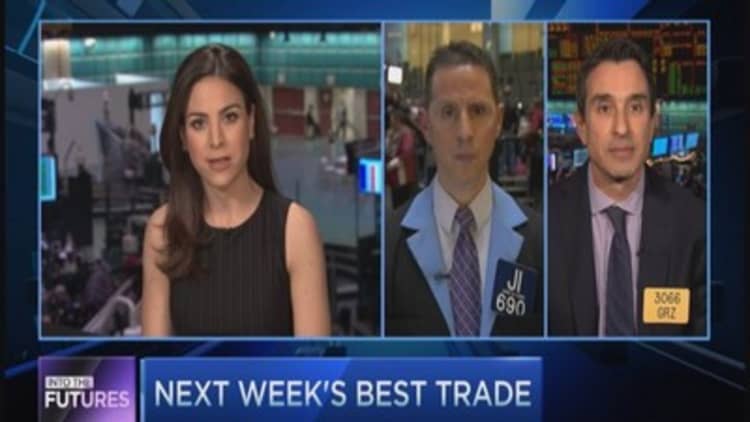
It may not feel like it, but stocks are actually more expensive than they've been since 2005. Still, most investors say that shouldn't be a huge cause for concern.
The 's price-to-earnings ratio, which compares the price of the S&P to analyst projections of what S&P companies will earn over the next 12 months, has risen to 16.6, according to FactSet. Not only is that above historical norms, but it is the highest that metric has been since March of 2005.
What's unusual is that stocks have gotten more expensive in terms of valuation, even as the market itself has been relatively stagnant: The S&P has logged only mild losses on the year through Friday's close.
Read MorePower play: S&P targets 2,200
That's because earnings estimates have fallen dramatically of late. In fact, from the end of the year until now, analysts have decreased their estimate for what S&P 500 companies will earn over the next year by nearly $3, or 2.2 percent. So even as the price/earnings (P/E) equation's numerator has stagnated, earnings have fallen.
Unsurprisingly, much of the decline in earnings expectations comes from energy sector analysts, who are still reeling over oil's 50 percent plunge from its 2014 highs. From the end of the year, earnings per share estimates for the energy sector have swooned 27 percent.
Since share prices haven't fallen nearly as much, the overall impact is that the P/E for the energy sector has risen to 22.4, FactSet senior earnings analyst John Butters finds—the highest for any sector in the S&P.
The cuts have indeed come fast and furious. For instance, when Credit Suisse downgraded Exxon Mobil on Friday morning, it slashed its 2015 EPS estimate for the oil giant from $5.04 to $2.82.
Still, the stock is down just 13 percent over the past six months, which gives a flavor of the dynamic in the energy sector that has sent valuations way higher.
No magic, just math
But those taking the longer view note that there's another reason why valuations have risen of late, and that's interest rates. The 10-year Treasury yield has plunged to levels previously thought unthinkable given the state of the economy, which provides a natural tailwind for stocks.
Read More This measure says stocks are really cheap…maybe
Noting that assets like stocks are valued based on their expected cash flows given the risk-free rate, rather than on strict price-to-earnings multiples, Convergex chief market strategist Nicholas Colas wrote in a recent and slightly peeved-sounding note that with Treasury yields "falling like a stone, discount rates are lower than all but the most crisis-ridden periods of the last 100 years."
He added, "so yes, the U.S. stock market carries a high multiple to earnings relative to history. But that's not magic or mania; that is just math."
And traditional measures of market anxiety like the CBOE Volatility Index aren't registering much concern, either. Even as stocks are slightly down, the VIX has dropped 13 percent this year, indicating that investors now have less interest in buying "insurance" on the market in the form of downside puts.
"Valuations in the U.S. are probably a little on the high side, but I don't think they're grossly overvalued, and a lot of times stocks can be fairly valued or even overvalued for a long time," said Curtis Holden, senior investment officer at Tanglewood Wealth Management. "So even assuming valuations are a little rich, it's doesn't necessarily mean you'll see a crack in the market immediately."
In fact, Holden says he has actually become more bullish over the past few months, due to precisely the same catalyst that has sent valuations rising—the plunge in oil and gas prices.
"When you look at the fact that we're a net importer rather than exporter of oil and gas, it becomes clear that it's a net positive. There are going to be a lot of industries that benefit from low oil prices," including airlines, chemical and other industrial companies, and certain retail names.
The money that consumers save on gasoline "might not show up in earnings immediately, but eventually it will start filtering out into the market, and that will be something to watch," he said.
—By CNBC's Alex Rosenberg.
Watch "Futures Now" Tuesdays & Thursdays 1 p.m. ET exclusively on FuturesNow.CNBC.com!



